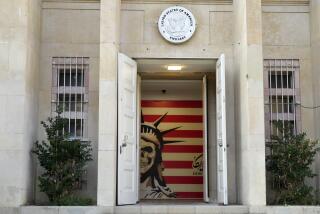New U.S. Sanctions Will Backfire, Iranians Say : Embargo: President Rafsanjani, opposition leader warn that moves will unify people behind Tehran government.
TEHRAN — President Hashemi Rafsanjani and Iran’s leading internal opposition party warned Monday that a new U.S. economic embargo will backfire politically by rallying support behind the Iranian government and fomenting greater anti-American sentiment among Iranians.
Rafsanjani said his people are increasingly angered by “bullying tactics” of the United States. “And you should know you can’t make the people of Iran surrender by bullying and force,” Rafsanjani said in an interview Monday with ABC-TV’s Peter Jennings.
Rafsanjani charged that the Administration’s basis for imposing the embargo, announced on April 30, was unfounded. The United States, he asserted, had failed to provide evidence of Iran’s support for international terrorism or its development of nuclear or chemical weapons.
“The U.S. has nothing,” he said. “If they can prove only one charge, then we will accept the rest of the accusations.”
In response, State Department spokesman Nicholas Burns said in Washington that the United States has clear evidence of both Iran’s support of terrorism and its development of nuclear weapons.
“The United States government believes very strongly, based on all of the evidence available to us from all sources possible, that Iran has designs--serious national designs--to build a nuclear weapons capability in the near future,” Burns said. He added that the U.S. government had “a long list of terrorist organizations that are currently being funded by Iran.”
Although the new sanctions--a complete trade embargo--are not expected by Iran to have much economic effect on the country, they already have had substantial psychological impact: panic buying of dollars, which has cost the Iranian rial more than half of its value of six months ago.
In response, the Iranian government announced plans over the weekend to introduce the death penalty for currency violators and economic saboteurs.
Ibrahim Yazdi, new secretary general of the outlawed Freedom Movement of Iran, agreed with Rafsanjani that U.S. measures are backfiring. “There is greater antipathy toward the U.S. government than at any time since the early days of the [1979] revolution,” he said in an interview.
“The embargo will not mobilize the Iranian public against the government, as intended, but instead cause even opponents of the regime to unite with the government against the United States,” he said. “It also endangers tentative new political openings at home. Many of us feel that U.S. policy is actually helping the Iranian Establishment and hurting the cause of democracy.”
The clergy-led government gradually has been tolerating dissent by the Freedom Movement and other opposition groups. But when a government as powerful as the United States squeezes Iran, government factions opposed to such dissent will use the embargo as a pretext to close the system again, added Yazdi, a former foreign minister who broke with the regime after the 1979 seizure of the U.S. Embassy in Tehran.
Reflecting the widening gap between the two governments, Rafsanjani also claimed that the Clinton Administration missed an important signal from Tehran about better relations when it forced a U.S. company to cancel a $1-billion deal with Iran this spring. President Clinton threatened to issue an executive order to block the deal if Conoco Inc., a subsidiary of DuPont, did not back out of a contract to develop offshore Iranian oil and gas. “This [contract] was a message to the U.S. which was not correctly understood,” Rafsanjani said Monday in the ABC interview.
To conclude a deal with a U.S. company, the government had to overcome “a lot of difficulty” because of public opinion, he added. That disclosure confirms contentions by U.S. experts on Iran that the Conoco deal marked an important overture from Iran--and a departure from years of vitriolic anti-American rhetoric.
But in a series of recent press interviews, the Iranian leader has indicated that, despite the U.S. embargo on trade with and investment in Iran, the door is still open to the United States.
“If the United States could prove that it still has no ill intentions and has good intentions and has balanced conduct like Germany, France and Japan,” then resumption of ties “would come up for discussion,” Rafsanjani said in a weekend meeting with Iranian editors.
Rafsanjani called U.S. allegations about a secret nuclear weapons program “lies.” He also pointed out that the United States is helping arrange delivery of nuclear technology to North Korea, a country that it considers hostile.
More to Read
Sign up for Essential California
The most important California stories and recommendations in your inbox every morning.
You may occasionally receive promotional content from the Los Angeles Times.










